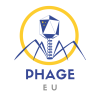How phages help fighting AMR: real-life example
The WHO has declared Antimicrobial Resistance (AMR) to be one of the top 10 global public health threats facing humanity, and in 2022, the European Commission, together with the Member States identified AMR as one of the top three priority health threats in the EU. It is estimated that more than 35 000 people in the EU/EEA and more than 1.2 million people globally die each year as a direct consequence of an infection due to bacteria resistant to antibiotics. If no further action is taken, the global AMR death toll by 2050 could reach more than 10 million annually, higher than the expected number of deaths from cancer and diabetes combined and could cause economic damage as catastrophic as the 2008-2009 global financial crisis.
Proteon believes that bacteriophages (phages for short) are a key part of this solution. They present a viable antimicrobial alternative to antibiotics whereby the bacteria are actually destroyed, thus reducing the bacterial load in the environment, animal or in humans.
Furthermore, it is well documented that use of bacteriophages are highly effective against antibiotic resistant bacteria and can actually reduce resistance. The bacteria enter into an evolutionary arms race to adapt to a new foe, and in doing so, makes them more susceptible to antibiotics, thus extending the potential life of antibiotics for years to come when they may have otherwise become obsolete due to an expanding resistance profile. Thus, the complementary use of bacteriophages and antibiotics is beneficial for reducing overall pathogenicity of problem bacteria. Additionally, phages do not generate antimicrobial resistance.
In one case study, for example, Proteon successfully used phages to eradicate antibiotic resistant e.coli strains in a flock of turkeys. Before treatment with phages, colistin resistant e.coli was detected in the flock causing widespread sickness and high mortality. AGer treatment, not only was the antibiotic resistant bacteria no longer detected, but the flock was in a much better condition and was even responding well to colistin antibiotic treatment.
According to Proteon Pharmaceuticals CEO, Prof. Jarosław Dastych, products based on bacteriophage technology have already been approved in many countries around the world. Access to innovative phage solutions in the European Union, however, remains limited and Europe is lagging behind in this innovation. In order to find a solution to the AMR challenge, countries around the world need to come together to implement careful stewardship of current solutions as well as searching for new alternatives. This needs to be brought together with effective prevention and control measures to manage bacterial outbreaks. It is a cross-border issue, which can only be addressed through initiatives such as the EU “One Health” approach. As AMR encompasses human health, animal health and the environment it requires a high level of collaboration across sectors and between countries, including at a global level.
Benjamin Hall
Head of Partnerships at Proteon Pharmaceuticals https://www.proteonpharma.com/
What is PhageEU
Phage EU is a coalition of likeminded stakeholders who represent phages in industry, the scientific community and civil society. We want to realize the full potential of phages in Europe. https://phageurope.eu
Media Contact
Margareta Przybyla, EU Public Affairs Advisor, mprzybyla@phageurope.eu, Tel : 0032 476 501 001
